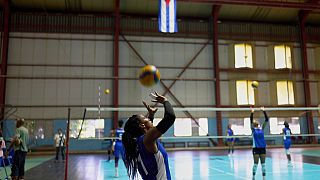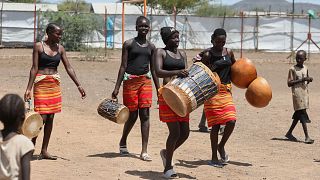Kenya
**Fencing offers a ray of hope to young people living in Nairobi's poorest neighbourhoods.
**
Despite a lack of equipment, the sword fighting sport is growing in popularity in Kenya.
They cut a striking group as they wander through Huruma in their pristine white outfits.
These young people are heading for their favourite hang-out spot: the Tsavora Fencing club at the local community centre.
The street becomes their arena as they parry and riposte in front of passers-by.
This is not just a hobby for them: it's a force for good in their lives.
Fencing has helped carve a path away from crime, drugs and other social pressures.
"I used to be a gangster," says Mburu Wanyoike, who is now a coach for Kenya's National Fencing team.
"I was in crime and crime makes you feel isolated. It actually puts you in a place where you are isolated, making you feel depressed, having stress and I chose fencing as a way for me to escape out of the hood and escape that lifestyle."
His journey from delinquency to fencing coach and senior athlete in Kenya's national team has been transformative.
Inspired by the personal tragedy of the death of two friends, Wanyoike pursued training and education in South Africa, ultimately founding Tsavora Fencing in 2021.
Tsavora Fencing has made significant strides.
The team has produced 15 talented fencers who have earned spots in the national squad, with plans to represent Kenya in the African Olympic Qualifiers in Algeria this year.
However, challenges persist, particularly regarding the affordability of fencing equipment.
"Sometimes it is tough when it comes to competing with well-equipped international countries that are well organized, so what we do is just to move on with enthusiasm and obsession. The fact that we don't have the equipment, the limited ones we have, we use them. We don't complain that we do not have equipment, we just use what we got and put in the obsession and the enthusiasm and the passion combined, that's what we do, we fence," says Wanyoike.
Tsavora Fencing Mtaani, an initiative under Tsavora Fencing, offers mentorship and training in fencing to the youth of these impoverished neighbourhoods, shielding them from the dangers of their environment.
With 45 members, most of whom are students, the team serves as a beacon of hope in the community.
Participants are required to become disciplined and put on integrity.
"Initially I had bad company at home but now that I am in fencing, it has kept me busy and now it is a better option for me because I feel happy doing it," says Jemimah Njeri, a 17-year-old member of Tsavora Fencing.
"I cannot imagine myself without this sport because it has kept me very busy. In my area many girls have become teenage mothers and that is not a wonderful life," adds 16-year-old Allen Grace.
Steve Okalo, Secretary General of the Kenya Fencing Federation, acknowledges the uphill battle the sport faces in gaining popularity but remains optimistic about its future.
"Fencing is not a popular sport like football or athletics, but we are trying our best to see how it is going because when we started, I started with about four people and now I'm seeing that I have good fencers," Okalo remarks.
As Tsavora Fencing continues to thrive, fuelled by the determination of its members and the support of the community, it stands as a testament to the transformative power of sport in, even the most challenging environments.













01:47
New International Olympic Committee president Kirsty Coventry faces high expectations
00:51
World Boxing apologises for naming Imane Khelif when announcing new sex testing policy
Go to video
Kenya's Sawe wins London Marathon as Ethiopia's Assefa takes women's race
01:09
Zimbabwean Kirsty Coventry elected International Olympic Comittee president
22:26
Boxer Imane Khelif says unbothered by gender talk ahead of 2028 Olympics
03:12
Outgoing IOC chief defends women boxers at centre of Paris gender row